SOLID and DRY Principles
Ever tried baking a cake and ended up with a fire alarm serenade instead of a delicious dessert?
10/18/20245 min read


SOLID and DRY Principles
Ever tried baking a cake and ended up with a fire alarm serenade instead of a delicious dessert? Programming can feel like that sometimes—messy, confusing, and a little smoky. But fear not! Just as recipes guide chefs, programming principles guide developers. Today, we'll explore the SOLID and DRY principles, which help you write clean, maintainable code that won't set off any alarms.
Introduction
In the vast world of software development, writing code isn't just about making things work. It's about creating code that's easy to understand, maintain, and extend. Think of your code as a Lego masterpiece—you want others to admire it and maybe add their own blocks without the whole thing collapsing.
Two sets of principles can help you build this masterpiece:
SOLID: A set of five object-oriented design principles.
DRY: A principle aimed at reducing repetition.
Let's dive into these principles with some light-hearted examples!
The SOLID Principles
1. Single Responsibility Principle (SRP)
Definition: A class should have only one reason to change, meaning it should have only one job.
Imagine: A Swiss Army knife that's also your phone, toothbrush, and frying pan. Sounds cool but try brushing your teeth while flipping an egg and taking a call. Not so efficient, right?
Programming Example in C#:
Bad Code:
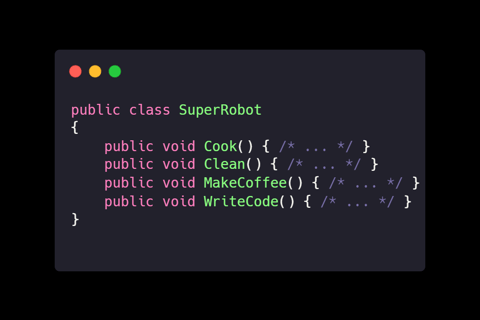

Good Code:
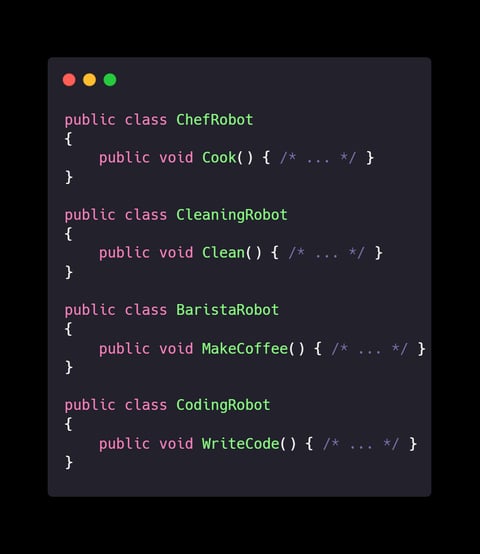

Explanation: By giving each robot one job, they become experts in their field—no more burnt coffee or buggy code!
2. Open/Closed Principle (OCP)
Definition: Software entities should be open for extension but closed for modification.
Imagine: You have a magical wardrobe that gives you new outfits. Instead of stitching new clothes into the existing ones (awkward), it simply adds new options. Your old clothes stay intact!
Programming Example in C#:
Bad Code:
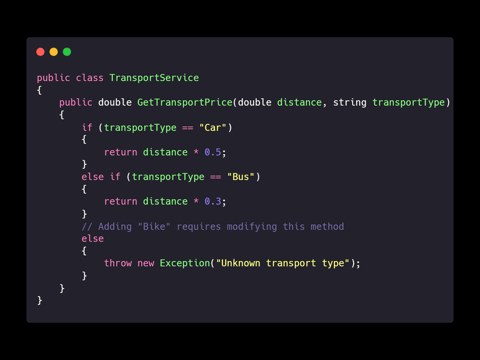

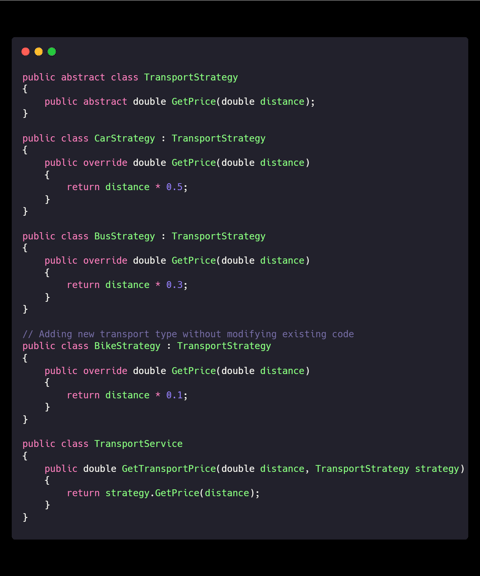

Explanation: New transport types can be added without altering the original TransportService class, preventing accidental bugs.
3. Liskov Substitution Principle (LSP)
Definition: Objects of a superclass should be replaceable with objects of a subclass without altering the correctness of the program.
Imagine: You have a pet-sitting app. If someone books a pet sitter for a "Dog," they expect walks and playtime. If "Dog" is substituted with "Dragon," the pet sitter might have a fiery surprise!
Programming Example in C#:
Bad Code:
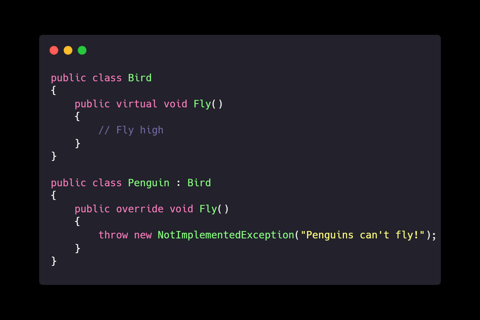

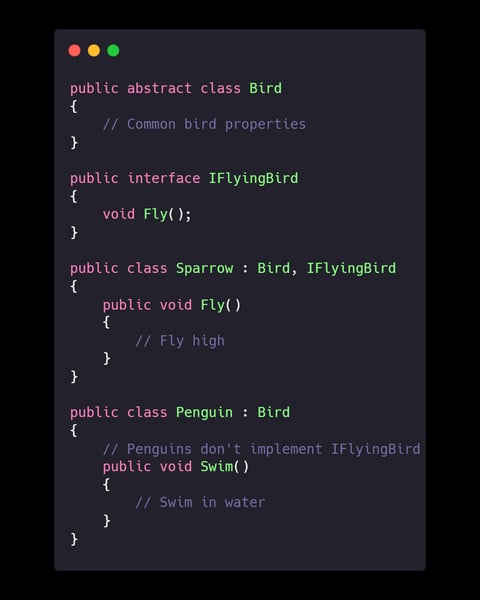

Explanation: By not forcing all birds to implement Fly, we prevent unexpected errors when substituting subclasses.
4. Interface Segregation Principle (ISP)
Definition: No client should be forced to depend on methods it does not use.
Imagine: You're handed a remote with 100 buttons just to turn on the TV. Confusing, right? You only need the power button and maybe volume controls.
Programming Example in C#:
Bad Code:
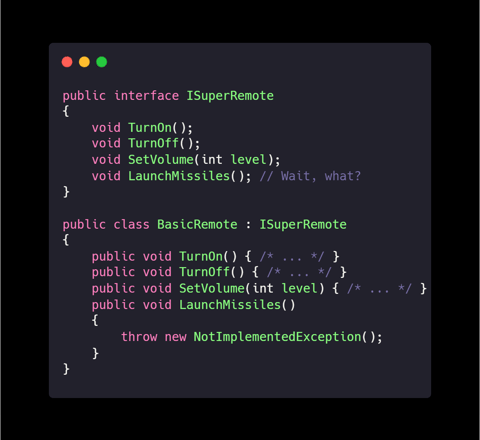

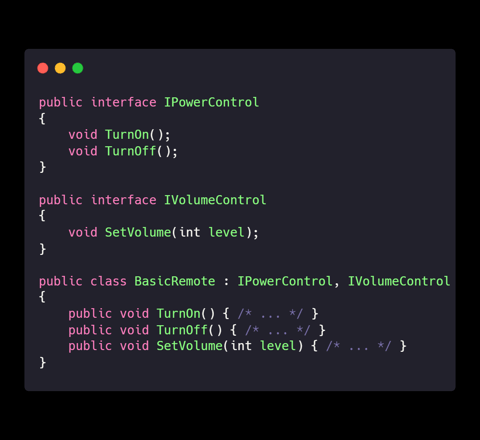

Explanation: By splitting interfaces, classes only implement what they need—no mysterious missile buttons!
5. Dependency Inversion Principle (DIP)
Definition: High-level modules should not depend on low-level modules; both should depend on abstractions.
Imagine: A boss only communicates through memos (abstract messages). Whether the memo is sent via email, carrier pigeon, or smoke signals doesn't matter to the boss.
Programming Example in C#:
Bad Code:
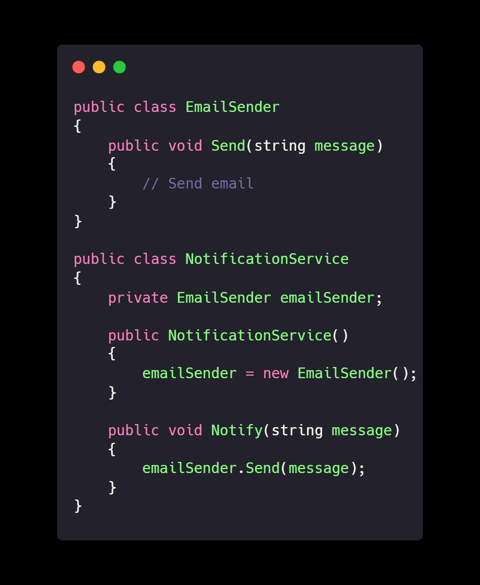

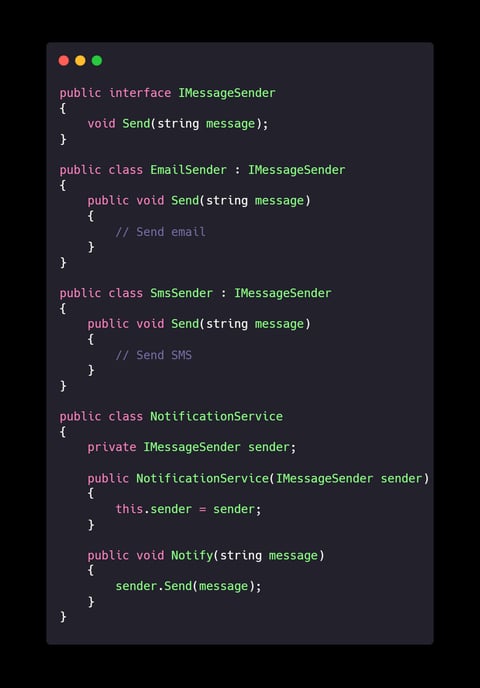

Explanation: The NotificationService depends on an abstraction (IMessageSender), allowing it to use any kind of sender—email, SMS, owl post, you name it.
The DRY Principle
Don't Repeat Yourself
Definition: Every piece of knowledge must have a single, unambiguous, authoritative representation within a system.
Imagine: You're telling a story, and every time you mention a character, you explain their entire backstory again. Your listeners will be asleep before you reach the climax.
Programming Example in C#:
Bad Code:
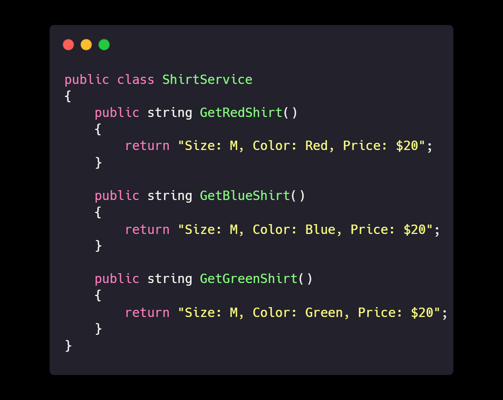

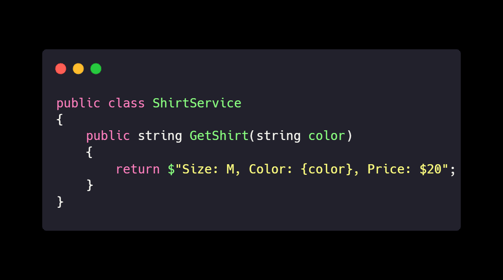

Explanation: By creating a generic GetShirt method, we avoid repeating code and make it easier to manage changes (like updating the price).
Why These Principles Matter
Maintainability: Easier to update and fix code without causing unexpected issues.
Scalability: Simplifies adding new features or components.
Readability: Code is cleaner and more understandable.
Collaboration: Team members can work on different parts without stepping on each other's toes.
Humor: Fewer code smells mean fewer facepalms and more time for coffee.
Conclusion
Think of the SOLID and DRY principles as the superhero training manual for your code. They help you fight off the villains of messy code and bugs. By following these guidelines, you write code that's not just functional but elegant—code that would make even your mother proud (even if she doesn't know what code is).
So, the next time you're tempted to copy and paste that chunk of code for the fifth time, remember: a little planning and adherence to these principles can save you—and your team—a lot of headaches.
Happy coding, and may your bugs be ever minimal!
Summary
SOLID Principles:
Single Responsibility Principle (SRP): A class should have only one reason to change. Keep classes focused on a single task to make them easier to maintain.
Open/Closed Principle (OCP): Software entities should be open for extension but closed for modification. Extend functionality without altering existing code to prevent introducing bugs.
Liskov Substitution Principle (LSP): Subtypes must be substitutable for their base types. Ensure derived classes enhance, not alter, base class behavior.
Interface Segregation Principle (ISP): Many client-specific interfaces are better than one general-purpose interface. Classes should not be forced to implement interfaces they don't use.
Dependency Inversion Principle (DIP): Depend on abstractions, not on concrete implementations. High-level modules should not depend on low-level modules but on shared abstractions.
DRY Principle:
Don't Repeat Yourself: Avoid code duplication by abstracting common functionality. This reduces the risk of inconsistencies and makes maintenance easier.
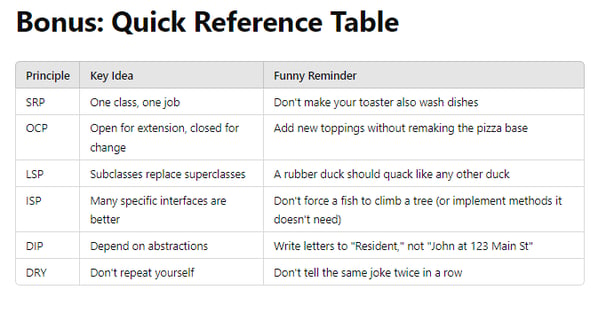

Now go forth and build software that even your future self will thank you for!
